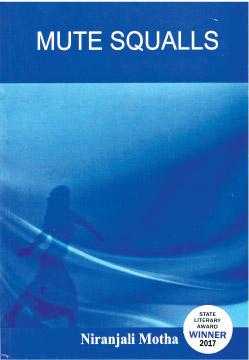
Mute Squalls
Author: Niranjali Motha
An author publication
Price Rs 300
Reviewed by R.S. Karunaratne
In a short story, a form more realistic than the tale and of modern origin, the writer usually presents the main events in greater fullness. Writers of short stories are skilled in rendering a scene with a vivid or dramatic moment described in detail to create the illusion of reality that the reader is going to experience. A finely wrought short story has the richness and conciseness of an excellent lyric poetry. Spontaneous and natural as the finished story may appear, the writer has written it so artfully that there is meaning in all seemingly casual speeches and apparently trivial details.
The opening short story “The Whited Sepulchre” is woven around the ethnic problem. The writer has been able to keep the reader in suspense until the end of the story. However, this is followed by “Abstracts” which seems to lack the basic elements of a short story. “The Excess Baggage” is a sad and moving encounter with a poorly paid shop worker. “The Squall” is a beautiful short story expressing empathy towards the listener. The writer meets a youth in Cambodia and listens to his tale of woe. His father had been abducted when he was a child. Now he laments because his father did not return home. He had not seen his father’s dead body and thinks that he might be living somewhere. The narrator encourages him to speak out. At the end he appears to have come to grips with life’s numerous problems. “The Excess Baggage” is followed by another fine short story titled “Porcelain Pebbles.”
“The Evaluation” is a story of sexploitation. The protagonist, a humble typist, marries someone above her social status. She transforms herself into a society woman and begins to show off her beauty and power. In the process she becomes a victim of circumstances and is lured by someone at the top management. Although she does not stoop to the level of a whore, she becomes the centre of all office gossip. The writer has captured her mental agony and explains sympathetically why she became a sex object who exploited her beauty. Such characters are not rare in society.
“Nibbana” is woven around a platonic love affair. Such affairs are very common in schools and work places. Although such lovers may hold hands or exchange a soft kiss on the cheek, they never end up by tying the knot. Even after they get married to someone else, they still carry the fond memories for a very long time. The author has captured the essence of platonic love beautifully in this short story.
On the other hand, “Agape” is a story full of miracles. Some people do not believe in them but “Agape” compels the reader to believe in miracles. We should remember there are certain phenomena the human mind cannot comprehend.
Niranjali seems to have understood that a good short story is more than a look into the world that one sees. It is the product of craft and intelligence. Its shortness makes it hard to write because it must make its point with a few words. Because of this limitation, most short stories confine themselves to one, two, or three characters and to one significant event or climactic segment in the lives of its characters. Such elements are found in most of the short stories in the anthology.
The two sources for her short stories appear to be her personal experiences and those of others. If all the materials of fiction are so derived then what is there that is creative about writing? If we turn to architecture, we find the answer. A beautiful building is made up of hunks of metal, concrete slush, and other products of earth, air and water. But, the final product does not show such prosaic things, but a wonderful building. Niranjali’s short stories, with a few exceptions, are a product of creative arrangement achieved by the writer through selection of the materials of real life and of the real world which she has accumulated either directly or vicariously.
At a time when English writing in general and short story writing in particular are at a low ebb in Sri Lanka, Niranjali Motha has presented the reader with a string of short stories that evoke happiness, surprise, remorse and an unbridled sense of euphoria. No wonder, the author won the prestigious State Literary Award for her anthology in 2017.
